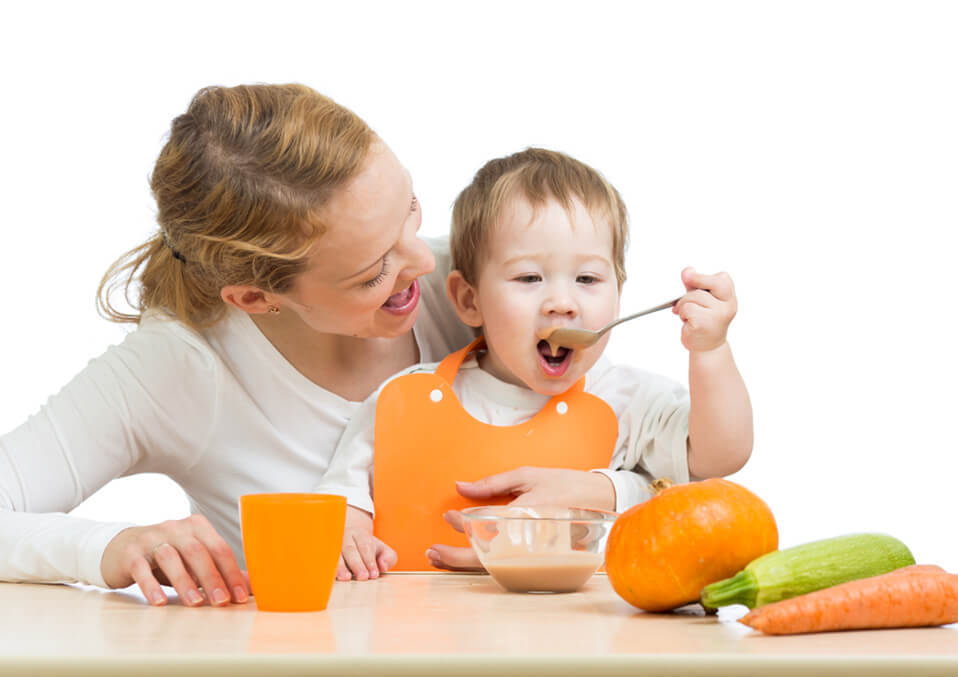
A toddler that is able to spoon-feed himself independently is considered a milestone in their growth phases. This is not an overnight process, as a parent, it takes great patience for you to be able to teach them how to be independent in doing things for survival such as eating. Not only that the value of being independent is instilled, but what’s more important is that the toddler’s mental and bodily functioning is stimulated for it to develop more. In this article, we’ll show you ways on how to introduce spoon self-feeding to your toddlers and what are the underlying benefits from it.
When to start spoon feeding your toddler?

Before letting your toddler hold a utensil, it is advisable to let them eat by themselves with the use of their bare hands so that their grasping skills are practiced. When the toddler is able to grasp their food into their mouth properly, he is able to swallow his food without pushing it back, and when the toddler can sit steadily without support it means that they are now ready to spoon self-feeding.
Read also:
Ways to introduce spoon self-feeding

- Let your baby practice
There are ways by which you can let your toddler practice spoon self-feeding by means of eating with the use of bare hands or with the use of a utensil. Your toddler will learn how to spoon feed himself later when you would put the food in his mouth every time. You can start by putting the food in front of him with a spoon, if your child is hungry, most likely he’ll imitate the way how you feed him and that is by the use of the spoon.
The first try will not always be the best one, there is a possibility that the food won’t be scoop by the spoon, if you see that your child is a bit frustrated, that is the time you help him eat. There are still a lot of opportunities to let your toddler practice just make sure to be consistent in introducing him to the use of a spoon.
- Encourage hand feeding
Expect that your child will not automatically learn how to use a spoon. The first step is to let him feed himself through the use of his bare hands by placing small chunks of food in his high chair. Your goal is to let the child practice his gripping capabilities. They may use their whole fist in picking up the food so make sure that the size of the food will enable him to use his thumb by making use of quite small pieces.
- Encourage utensil feeding
While you are feeding your toddler, it is advisable to also provide him with utensils so that there is a higher chance that he can imitate you. If you would expose your toddler to this kind of set-up regularly, the sooner they’ll be more comfortable and confident in holding it and grabbing food with it.
- Stay bedside your toddler while eating independently

If you just stay beside your toddler while he is eating, you’ll be able to know his tolerance about certain foods and that you get to monitor how much food he is putting in his mouth to avoid choking. You should be able to distinguish gagging from choking due to too much food on his mouth. Gagging means if the gag reflex, lets the food go back toward the front of the mouth to avoid blocking any airways while choking is when the food blocked an airway resulting in difficulty in breathing. Choking is fatal so always guide your toddlers whenever they eat by themselves.
- Expect the mess
Be ready with the mess your toddler will create due to spoon self-feeding. You may need to let him wear aprons or bibs so that when there is spillage, the food will not ruin their clothes.
- Eat with the family
Toddlers tend to model behavior from adults on how they use the utensils and table etiquette. The toddler will also be encouraged to use the spoon by himself if he sees that all are using utensils while eating.
- Be patient
In introducing spoon self-feeding, it may take time for the toddler to do it correctly but don’t rush them, let them discover how things are done so that they can feel a sense of independence.
Choosing the best spoons for toddlers
Toddlers still have a delicate mouth. Experts wouldn’t recommend the use of a silver spoon because it tends to have hard and quite sharp edges that may hurt the gums of toddlers. The recommended spoon for them is the spoon that is made up of plastic or rubber that will not cause any harm to their delicate mouths.
Benefits of spoon self-feeding of toddlers
- It enhances sensory experiences
There is a higher chance that toddlers tend to have an increased sensory experience when they are taught how to spoon self-feeding because they tend to experience the texture, smell, and taste of what they are eating.
- They are able to practice their being independence
Toddlers are not given the autonomy to do what they want. At this stage, independence and autonomy are what they would want to claim for. Allowing them to eat by themselves is a perfect way to give them complete autonomy. By letting them feed themselves, they are able to control how much they are going to put in their spoon and swallow thus, they would feel the ownership in feeding themselves.
- Their grasping and coordination skills are developed
Before introducing the use of utensils to your toddler, it is best to allow them to eat using their bare hands first so that the way how they grasp things are practiced and so that it will be easier to coordinate their hands with their mouths.
- The toddler learns body awareness
Because of letting your baby spoon feed himself, he learns the exact functioning of his mouth and how he needs to bend his arms to be able to put his spoon in his mouth. If your toddler would do this routine on a daily basis, his brain will be stimulated that is why the next time he sees a plate with food in front of him, the initial reaction would be to hold the spoon and start scooping the food.
Read also:
- Can Toddler Drink Milk When Diarrhea?
- How To Get a Toddler To Take Medicine?
- How Important Toddler Feeding Schedule is?


